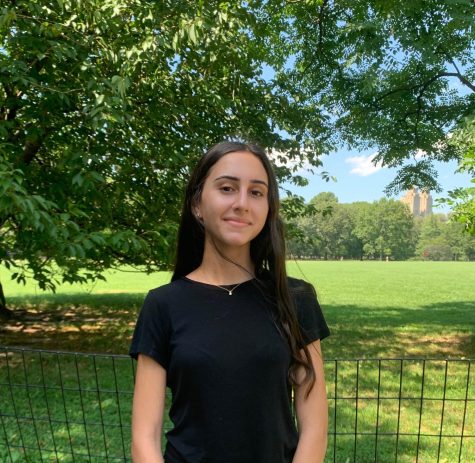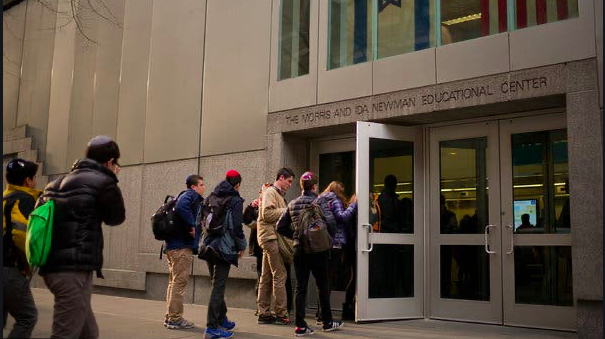Privileges, or Rights?
At Ramaz privileges are hierarchical. Seniors, juniors and sophomores all receive distinct freedoms to leave the school building during the school day. Seniors enjoy complete privileges—they are allowed to leave the school building at all times everyday. Juniors are privileged to leave school twice a week during lunch periods, a recent change from the once a week privileges juniors have traditionally experienced. Sophomores must wait until the end of the school year to obtain the right to leave school premises, once a week during lunch periods. Freshman are not granted privileges.
Most agree that it is not appropriate for first-year students to leave the building. Approximately 50% of the freshman student body is new to Ramaz, and many of them did not grow up in the city. Alex Zemmol ’21 said, “Parents trust Ramaz to watch over their children and do not want their kids roaming around the Upper East Side.” In addition, an important part of the first year of high school is making new friends and connecting with classmates. Ron Alweiss ’22 said, “If first-years were allowed to leave school, there would be no one at lunch and students wouldn’t get to socialize.” Also, allowing freshmen to leave the building may lead to cliques forming and students feeling left out. Maxwell Jankelovits ’21 said, “Students who are new to Ramaz would not know who to walk around with and may feel very lonely sitting by themselves in the lunchroom while others are out.”
In contrast to the first year students, the sophomores are comfortable with their classmates and the New York City environment. A lot of students complain that Ramaz should extend complete privileges to the sophomore and junior classes. Some argue that being able to walk around the Upper East Side is a nice break from school and should be allowed. Sophia Ratzker ’21 said, “The school often uses the phrase ‘the city is our backyard’ but I feel like we are not given the opportunity to explore the city. Ramaz has such a great location, and it should be taken advantage of.”
Many sophomores feel like a good start to privileges would be allowing them to leave the building once a week. Norma Tawil ’22 added, “In addition to privileges during lunch, I think every grade in the school should be able to leave during a free period. If a student does not have a class, I see no reason why the students cannot leave the building for a small break, perhaps not first-years, but certainly sophomores and up.”
The majority of interviewed students wish privileges were granted more generously.
Ella Hiltzik ’21 said, “Privileges are so useful. Even if it’s just to grab a cup of coffee or to get some fresh air, privileges are always helpful. If juniors could have them more often, that would be great.” Students work so hard and feel that getting out of school, for even just a few minutes in the middle of the day, can make a big difference in stamina and concentration. Ella Low ’22 said, “Junior year is known to be one of the most stressful years of high school. I feel like any addition that could possibly bring joy to juniors should definitely be established.” Emily Mullakandov ’21 said, “I enjoy my weekly privileges because they give me a chance to relax. Leaving the building is really helpful in taking the load off. If privileges were to be offered more often it would help the grade tremendously.”
Seniors, of course, enjoy full-time privileges. Not only do seniors feel independent and mature by being able to leave the building any time they do not have class, but they also feel special as these privileges set them apart from the younger grades. Alyssa Garbulsky ’20 says, “Being allowed to leave school makes us feel like the young adults that we are. After completing three full years of Ramaz’s rigorous curriculum, we have earned the right to some fresh air!” Some feel that the lack of these privileges prior to senior year adds to the exciting nature of having them as seniors. Rina Marlowe ’20 said, “It’s fun being able to bring coffee back for lowerclassmen—I feel so important. If I was allowed to leave school last year, then what would make me feel this good this year? But I still think the lower grades should enjoy these privileges too.”
While students do want freedoms, it’s important to remember that along with privileges comes responsibility. Currently, there is a strict policy regarding lateness and privileges. If a student returns to school late from privileges, their privileges are revoked. Some students feel this policy is too strict. Gabby Sakhai ’21 said, “There should be a more lenient system. Perhaps wait until someone is late three times to penalize. After all, how is being late from lunch different from being late in the morning?” Most students, however, do agree that this policy makes sense. The privilege system needs structure, and without rules there is no structure. Yona Weinstock ’22 said, “Privileges need to be treated with respect, and if a student does not follow the rules, they should be penalized.”
Rabbi Dov Pianko provides a teacher’s perspective on this issue. He thinks that it’s important for students to socialize. If students are allowed to leave during lunch, some who live nearby might go home and eat lunch there, alone or with a small exclusive group. Some students live just a few blocks away, and if they are allowed to leave, they will take the easy option rather than trying to make new friends. “We want our students to interact [with each other] and form relationships,” said Rabbi Dov. Additionally, some students might feel pressure if at lunch others choose to go to a restaurants that don’t meet their standards of Kashrut. “At a Yeshiva,” said Rabbi Dov, “students should not be put in a situation where they have to decide between their values and lunch options to socialize during a school day.” Also, other schools which allow students to leave during lunch don’t serve an outstanding spread like Ramaz does.
Overall, students are very grateful for the privileges granted to them. Allowing students to leave school, especially in New York City, is a large responsibility for Ramaz. It is difficult to track students and keep a record of who leaves and who returns. There are also many non-kosher establishments surrounding Ramaz and very few kosher options. In addition, it is important for students to bond and socialize during lunch and free periods. Yet, sophomores, juniors, and seniors cherish time spent in their NYC “playground” and continue to pine for more privileges. A break from the rigorous school day and the ability to get fresh air is a wonderful treat. It seems a compromise must be met. If juniors show that twice a week privileges work well, maybe sophomore privileges will start a bit earlier than in the past. Perhaps the recent increase in privileges for juniors is a sign of more to come, as our school continues to mold to the needs of its students and as student life at Ramaz improves day by day, privilege by privilege.

Caitlin Levine loves journalism, is an avid writer, and is thrilled to be an editor-in-chief of The Rampage. Caitlin has actively contributed to The Rampage...




